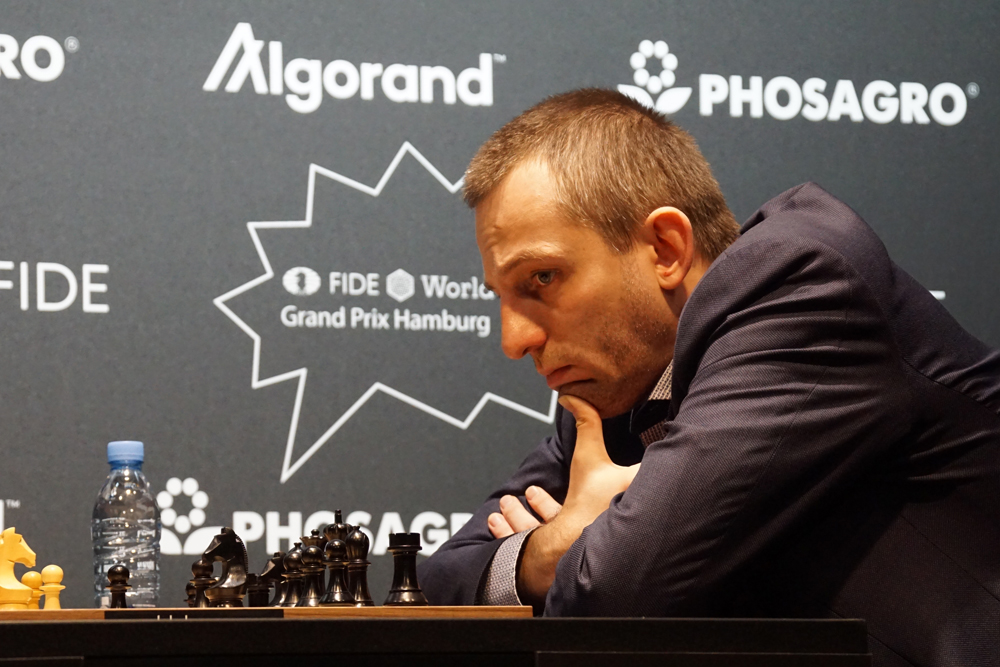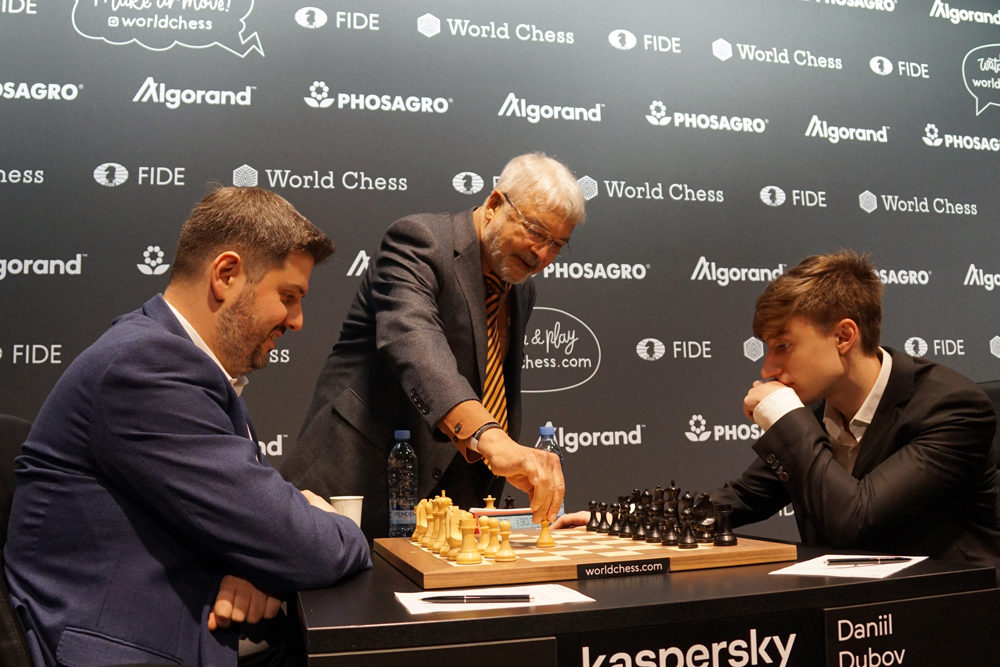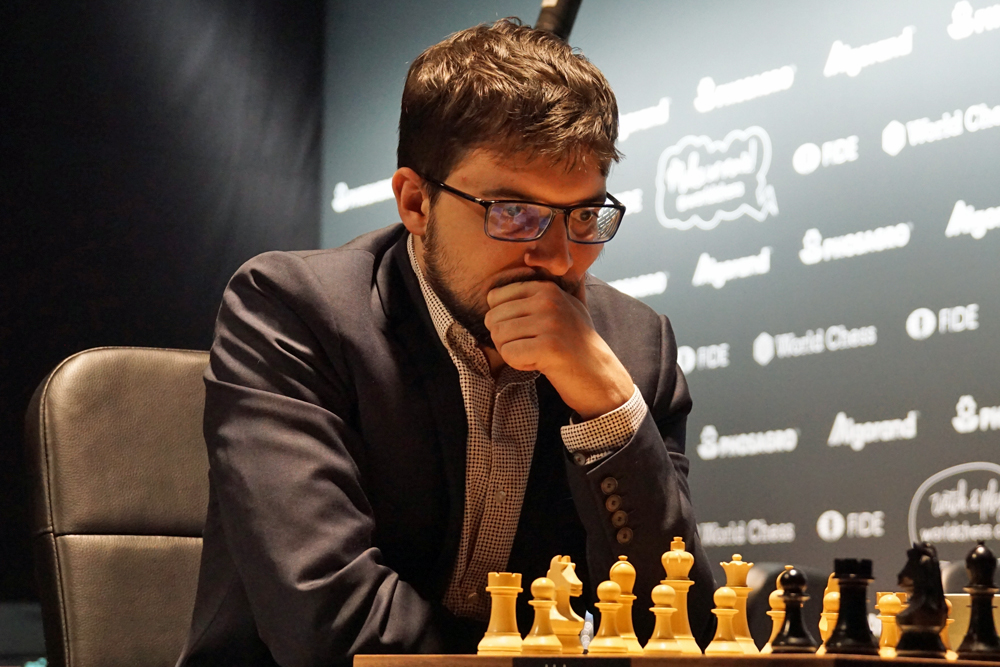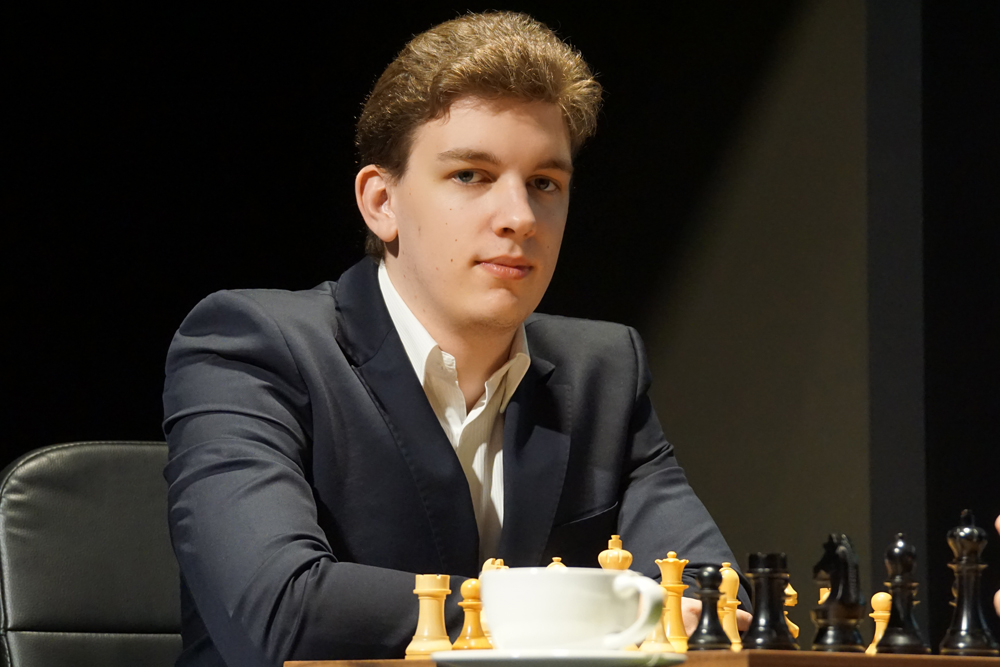


ChessBase 17 - Mega package - Edition 2024
It is the program of choice for anyone who loves the game and wants to know more about it. Start your personal success story with ChessBase and enjoy the game even more.
 The third leg of the FIDE Grand Prix is being played in Hamburg, Germany. The 16-player knockout has a €130,000 prize fund, with the series as a whole having an additional prize fund of €280,000 plus two qualifying spots for the 2020 Candidates Tournament. The tournament takes place in the Kehrwieder Haus from November 5th to 17th. You can find more info here.
The third leg of the FIDE Grand Prix is being played in Hamburg, Germany. The 16-player knockout has a €130,000 prize fund, with the series as a whole having an additional prize fund of €280,000 plus two qualifying spots for the 2020 Candidates Tournament. The tournament takes place in the Kehrwieder Haus from November 5th to 17th. You can find more info here.
Saturday's round in Hamburg had ChessBase co-founder Frederic Friedel as the special guest. The Editor-in-Chief emeritus of our news page made the ceremonial first move in the only match-up that will go to tiebreaks in the quarter-finals, Peter Svidler versus Daniil Dubov. Following Svidler's quip from Friday, when he mentioned that he did not know whether his home preparation was older than Dubov, we can certainly say that ChessBase is actually ten years older than the young Russian — the company was born in 1986 and Dubov in 1996.

Frederic Friedel played pawn to king four | Photo: Nadja Wittmann
It was an exciting day of chess at the Theater Kehrwieder, as Alexander Grischuk and Jan-Krzysztof Duda obtained fine victories to get their passes to the semi-finals. Grischuk will be facing Maxime Vachier-Lagrave, who drew Veselin Topalov from a position of strength after having won their first encounter a day earlier.
For either 'MVL' or Grischuk, winning the face-off will go a long way in getting one of the two Candidates spots at stake. For example, if the Russian wins that match in tiebreaks, even if he loses in the final he will get a six-point advantage over current co-leader Shakhriyar Mamedyarov, who would need to at least reach the final in Jerusalem to tie Grischuk's score (depending on how many rounds he goes through without needing tiebreaks). The standings table on Wikipedia gets frequently updated even with partial results.
Click or tap any result to open the game via Live.ChessBase.com
ChessBase 15 - Starter Package
The entry into the chess cosmos. ChessBase 15 program + new Big Database 2019 (7.6 million uncommented games). Plus 3 issues ChessBase Magazine and CB Premium membership for 6 months!
In a must-win situation, Topalov surprised his opponent with the French Defence, to which Vachier-Lagrave responded by going for a line that was "less theoretical and less direct". The strategy worked wonders for the Frenchman, who was in control all along, until signing the draw after 26 moves:
The Classical French - Main Line
After 1.e4 e6 2.d4 d5 3. Nc3 Nf6 4. e5 Nfd7 5. f4 c5 6. Nf3 Nc6 7. Be3, the author takes a detailed look at a daring line with 7... cxd4 8. Nd4 Qb6, as well as the quieter plans with 7...cxd4 8. Nd4 Bc5, and the main line with 7... a6 and b5.
White is clearly better, as he has more space, a safer king and the better minor piece — Topalov mentioned afterwards that he needs many tempi to activate his knight, awkwardly sitting on e7 at the moment. Vachier-Lagrave decided to call it a day and secured his second consecutive match win without tiebreaks. Smiling, he declared:
In the end I can play, but why would I?
Perhaps he should have done it on the outside chance of getting Anish Giri to eat his hat. Martin Bennedik shared that Vachier-Lagrave needed to gain 36 rating points to surpass Giri in the race to get the Candidates spot for the player with the highest average rating of the year. The Dutchman wittily responded:
If @Vachier_Lagrave wins 36 points I will eat my hat and personally fix his 6.Bg5 Najdorf. ;) Good luck in GP!
— Anish Giri (@anishgiri) November 2, 2019
Of course, 'MVL' agrees with Giri that gaining so many rating points is totally unrealistic. Luckily for us spectators, however, seeing members of the elite joking around on Twitter is an added bonus fans of some other sports do not have.

Maxime Vachier-Lagrave is in the semis | Photo: Nadja Wittmann
Out of a Ragozin Defence, the contenders followed fifteen moves of a game Navara himself had played against Kacper Piorun in last year's Bundesliga. The Czech star had won that encounter, but this time around he had to deal with a novelty that changed the nature of the struggle to a certain extent:
The Ragozin is being played by every top grandmaster in the world - it is time you also add it to your repertoire to get interesting and dynamic positions against 1. d4!
GM Alejandro Ramirez analyses every single move that White can play once the Ragozin is reached, but due to several transpositional possibilities he always emphasises strategic goals to keep in mind.
Later on, Grischuk mentioned that 15...g6 is a rather logical move that leads to a struggle in which White needs to play carefully. Navara spent a little over four minutes on the correct 16.♗e4 — perhaps he knew the move, as he actually was doing fine out of the opening.
With the kings castled on opposite flanks, the players went for parallel expansions against the opposite monarchs. It turned out that Black's attack was stronger though, with Grischuk later mentioning that he was proud of his 27...b4:
There followed 28.axb4 ♛b5 29.b3 a5, further opening lines against the white king. Navara tried his chances against the king, but Grischuk managed to transfer it to safety on c8. At that point, with mate-in-nine on the board, Navara resigned.
David Navara versus Alexander Grischuk | Photo: Nadja Wittmann
In this encounter, Yu Yangyi was the first one to deviate from theory, going for a move that the masters of the (distant) past perhaps would not have even considered:
Master Class Vol. 12: Viswanathan Anand
This DVD allows you to learn from the example of one of the best players in the history of chess and from the explanations of the authors how to successfully organise your games strategically, consequently how to keep your opponent permanently under press
Advancing the c-pawn for a second time in less than ten moves with 9...c5 is a suggestion of the engines. Duda was ready to face this and did not take long before continuing with 10.dxc5. The queens left the board four moves later, but despite their absence a sharp struggle ensued. Duda had the initiative, and Yu Yangyi kept finding the right moves to keep a tense dynamic balance. On move 32, however, the Chinese faltered:
Yu Yangyi's 32...♚h3 gave way to the lethal 33.♗xg4+. When Grischuk strolled around the playing hall and saw this move, he sort of shrugged, noticing what had just happened — Black cannot capture the bishop with 33...hxg4 due to 34.♖h8#, while capturing with the bishop would leave Black in a losing position an exchange and two pawns down.
The Chinese went for 33...♚h4, but he most likely knew that there was no way out. Resignation came after 34.♖xc8 ♜a1+ 35.♔g2 hxg4 36.♖e8.

Poland's number one Jan-Krzysztof Duda | Photo: Nadja Wittmann
Once again the all-Russian encounter was the shortest of the day. Out of a Sicilian Rossolimo, Dubov blitzed out all his moves until the draw was agreed on move 21. Svidler spent more than ten minutes more than once, demonstrating that he was not as well-prepared as his younger opponent. The veteran later declared:
I knew this was probably not the greatest idea in the world, but on the other hand every now and again you feel like playing a central line and actually asking the question, but Daniil is probably not the person to be asking that question to. [...] Daniil is one of the leading experts on this line, and against him probably 1.a3 is arguably a better choice.
Svidler and Dubov will play the only tiebreaker on Sunday, and the winner will be facing Duda in the semi-finals.
The Sicilian Rossolimo for White
The Rossolimo Variation 3.Bb5 is considered to be one of the strongest replies to 2…Nc6 in the Sicilian Defence. The fact that the move has been played by practically all the top players proves its popularity and strength. But the most interesting aspect of playing 3.Bb5 is that we force sharp, attacking players who love to have the initiative to forget about the Open Sicilian and to adjust themselves to a new world, one full of positional ideas, manoeuvres and nuances.
Svidler, Friedel and Dubov in good spirits | Photo: Nadja Wittmann
Commentary by GM Evgeny Miroshnichenko
| Nov. 5–7 | Round 1 + Tie-breaks |
| Nov. 8–10 | Round 2 + Tie-breaks |
| Nov. 11-13 | Semi-final + Tie-breaks |
| Nov. 14 | Rest day |
| Nov. 15-17 | Final + Tie-breaks |